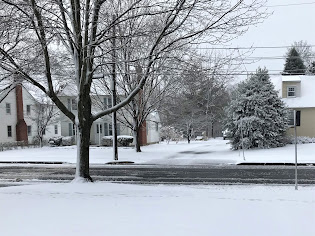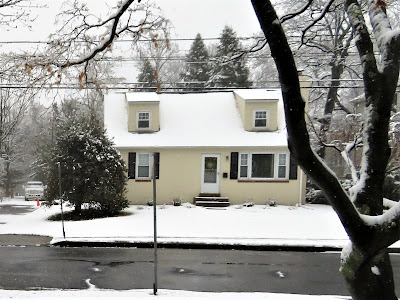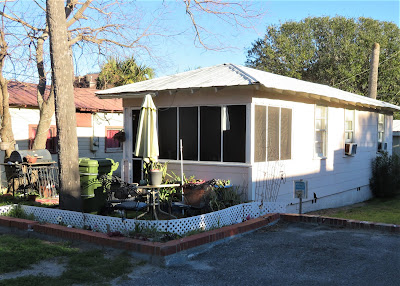We were at a wedding reception recently and sat down with another couple from our old hometown. We know them, but not too well. They are a few years younger than we are, and they live in a big house in one of the pricier neighborhoods in the area.
Of course, they wanted to know why we moved to Pennsylvania, and so we filled them in on our recent move to downsize to a smaller home, in a place where the cost of living, and especially the tax burden, is considerably less. They were interested in our experience and eager for advice.
They had raised their three children in a New York suburb. Now they were rattling around in their big house and thinking about downsizing. They had vacationed on Cape Cod a number of times, and were thinking about moving to the area. In fact, they had been on the Cape for a couple of weeks this summer, and had seen a cottage one block from the water that they liked.
"It's a really nice little place," said the wife, "with two bedrooms upstairs and a bedroom downstairs with a bathroom. We'd take the downstairs bedroom, so we wouldn't have to do stairs, and then the kids could stay upstairs when they came to visit."
"It's smaller than your house in Westchester?" I asked.
"Oh yeah," said the husband. "We'd be going from 3500 square feet to 1500 square feet. But what do we need more room for, at this point?" he asked rhetorically.
"But I don't suppose things are much less expensive in Cape Cod," I ventured.
"Oh, you'd be surprised. Not income tax. But the real-estate tax on the Cape Cod house is less than $5,000, compared to over $15,000 for our current New York house."
"But what about our friends?" the wife wanted to know. turning to B. "Do you keep up with your old friends in Westchester? And were you able to make new friends?"
So we explained how we'd considered moving into a planned community, with a clubhouse and a pool and built-in social groups, where we would almost automatically make new friends. But in the end we decided we wanted to be in a real town, with sidewalks, where we could walk to the restaurants, movie theater and library.
How did that work out for you? they wanted to know.
It was probably a little harder than moving to a place where your social life is already set up for you, we explained. But B has met plenty of people through church and the local women's group. And I joined a golf league and found a place where they play ping pong once a week. And we both have become involved in our senior learning center where we've met some like-minded people.
Then we told them we get back to Westchester three or four times a year and meet up with old friends for dinner or some other occasion. A few friends have come to visit us in our new digs. It's a 2 1/2 hour drive, so they can do it in one day if they don't mind a five-hour round trip. Or several have come down and stayed overnight, either with us or at an airbnb.
They brightened up when they heard about that, since they figured they'd have no problem attracting their old friends to come visit them on Cape Cod, even though it is a little farther away from home -- about 4 hours. And they liked the idea of settling in a town. The house they were interested in was one block off the main street, near a church they could join.
So, thinking about Cape Cod, I asked them if they liked to sail or go fishing. No, they said. They liked being near the water. But they were not big on boating or fishing. But the husband already had his eye on a golf course -- he'd played it once, and saw that there were several leagues. He felt he could find a group of guys to play with. He even thought he might get a part-time job at one of the golf clubs, in the golf shop or working on the course.
Still and all, they were having second -- and third -- thoughts about moving from the home where they'd lived for 25 years, where they raised their kids and where their kids stored all their old toys, stuffed animals, high-school reports -- and the athletic gear they hadn't used in years but assured their parents they would use again, just as soon as they got a chance.
But, like us, they have kids who have left home -- one in Virginia, one in New Jersey, and one on the West Coast. And they didn't have any grandchildren yet, so they didn't feel the urge to move to be near any one of the kids. Besides, they said, you never know when the kids are going to move again for a new job. None of them had bought a house yet; and they'd all moved at least twice since leaving college. They figured if they moved near any of the children, the kids would only up and move away again.
 |
| Our garage after we moved |
But still, the wife thought maybe they should wait to make their move, until they did start to have grandchildren. That way they could move near the new family that would be more likely to stay put.
And the kids themselves were resisting the idea of their parents moving to Massachusetts. They wanted to have a home base when they came back to see their friends, several of whom were still around, or if they wanted to take a trip to New York City.
And this couple also found the prospect of downsizing rather daunting. They had a four-bedroom house with a finished and furnished basement -- and probably very little of it would fit into a smaller New England home. And they had shelves and shelves of their kids' books and trophies and toys and equipment. Were they ready to deal with all that, or insist their kids come home and deal with it?
When the reception was over, after the speeches and the cake and the dancing, we said goodbye to our friends and wished them well. On the way home, B and I talked about them, wondering if they were really ready to make the big move, or if they were just dreaming.
We know that, despite all the people we know who move to the Sunbelt, or the articles we've read about downsizing, that in the end most people choose to stay where they are after they retire. A
Freddie Mac study from a couple of years ago showed that over 60% of older homeowners said they would prefer to age in place, rather than move to new quarters. It's the easiest option. You don't have to say goodbye to your friends. You don't have to find a new place to live. You don't have to clean out your basement or garage or attic, and confront your kids about leaving behind their childhood home.
 |
| Downsizing? It's never over. -- my closet today. |
I remember when my first wife and I sold our family home, soon after our daughter went away to college. My daughter was devastated. "What do you care?" I asked her. "You've moved away, and you're in college now."
"I know," she said sadly. "But I've lived in that house my whole life. It's my home."
That certainly gave us pause. But in the end we had to do the right thing for us, which was to move to smaller, cheaper quarters because it was a turbulent time, in the post-9/11 political and economic atmosphere. Or, to put it bluntly, I was losing my job, and we had to consolidate our finances.
Anyway . . . we thought that this couple was serious about moving. They seemed to have things figured out, as much as possible, and I also noted that the woman got a gleam in her eye when she talked about that house they were interested in. That's usually a telling sign.
We'll be interested to find out, next time we're back home in New York, if these people made the move, or decided to stay where they are, at home in their familiar community.































